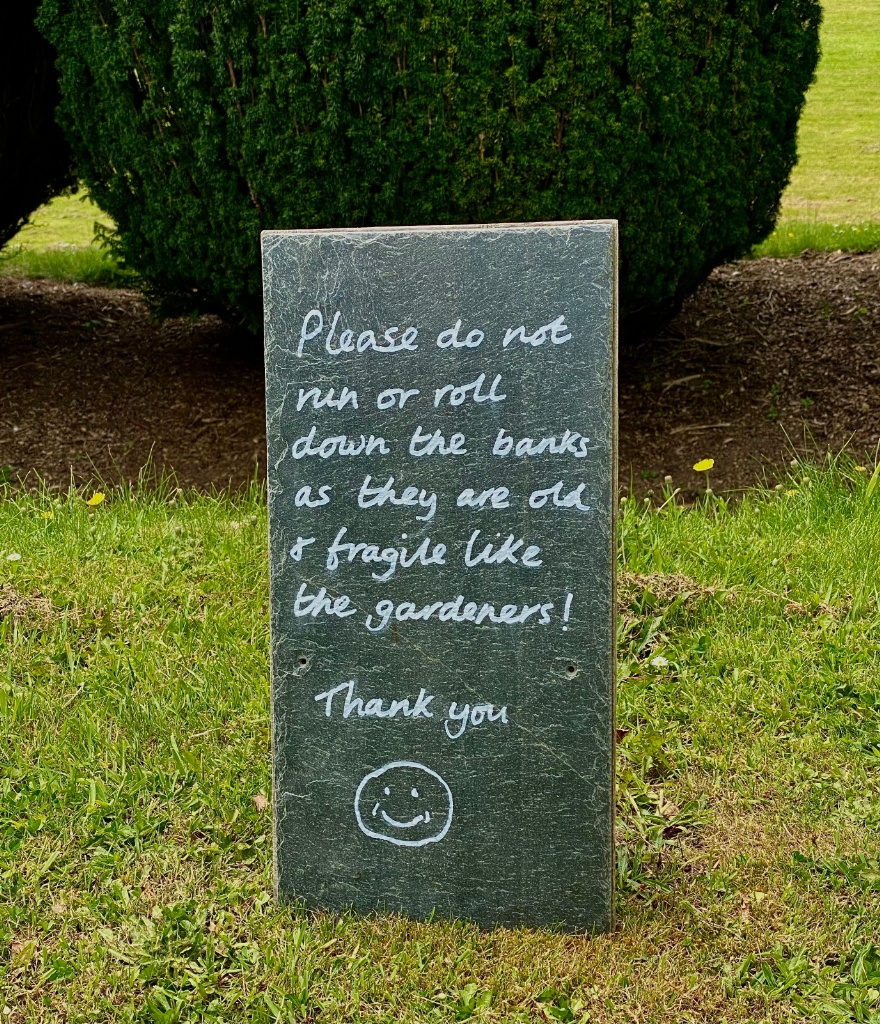No rolling

Dartington Hall, May 2021
Quote of the Day
”There are one hundred and ninety-three living species of monkeys and apes. One hundred and ninety-two of them are covered with hair. The exception is the naked ape self named Homo sapiens.”
- Desmond Morris, in the Introduction to his best-seller, The Naked Ape.
Musical alternative to the morning’s radio news
Vivaldi as you’ve never heard him played before
Link
Thanks to Seb Schmoller for spotting it.
Long Read of the Day
Let them eat Pasta
Striking polemic by Jack Monroe, author of A Girl Called Jack: 100 delicious budget recipes who also runs the Cooking on a Bootstrap blog. Her post is about aspects of the UK that many of us never see, or choose not to.
Stylistically, Monroe takes no prisoners.
The point is, it’s a whistle stop tour of penury and chaos on this hellscape island right now. Pensioners sitting in their winter coats with the heating turned off. Single mothers going to bed at 8pm when their children do, because there’s naff all to do in the cold and the dark on their own. (I did this ten years ago when my son was two, and it absolutely breaks my heart that a decade later, nothing has changed except the numbers of people living like this have increased exponentially.) Low-paid workers who stock the supermarket shelves relying on top-up benefits for their poverty wages in order to actually buy any of the produce that they’re handling, day in, day out. Teachers setting up food banks in their classrooms, and sneaking lunches to the children in their care. A mother in Hackney living in hazardous, mouldy, collapsing accommodation with her children for almost three years after her upstairs neighbours flat poured water through her ceiling, basically being told to shut up and put up with it. Nurses skipping meals to feed their kids. If you’re not already painting your placard and preparing to chain yourself to the railings outside Number 10 Downing Street – provided you can afford the train fare and some decent waterproofs and a bobble hat and to miss a couple of days off work – if you aren’t raging into the small hours of the morning at the flagrant injustice of Partygate superimposed on the backdrop of the food bank queues; if you aren’t reminding every mealy-mouthed Minister who bleats about ‘green shoots of economic recovery’ that those green shoots are fertilised by the bodies of the thousands who have lost their lives after cuts and failures and deliberate cruelty by the Department of Work and Pensions, what will it take to turn this stinking failure of a rotten ship around? Powered by the fumes of needless austerity ideology, the Titanic of our times, with the working classes held below deck to drown as the electorate drink taxpayer-funded champagne and dance with the taxpayer-funded band and laugh and laugh and laugh about it all, and ensure their taxpayer-funded £60k a year vanity photographer is on hand to capture their best angles at all times.
I get it, it’s exhausting. This shit-by-degrees, the chipping away at the threads of what was once a halfway decent social safety net. The cold, the hopelessness, the hunger, the shame, the gaslighting, the lies, the ‘compassionate Conservatism’ that’s anything but, the stealthy shift of responsibility from the Government to the voluntary sector to try to catch people as they fall, the sugarcoated ‘neighbourhood collection points’ in the supermarkets that their own staff eye up at the end of their shift, wondering which of the donated goods will end up in their food bank parcel that week.
Meanwhile, the supermarkets boast record profits for their shareholders; profits that would eclipse the top-up benefits their staff need to supplement their poverty-line wages. Read that again: the supermarkets could increase the hourly pay of every single member of staff to a baseline that would mean they wouldn’t need to apply for supplementary support, and they would STILL turn over millions of pounds in profit for their own pockets. But what should we expect, when the head of Tesco, John Allan, bleats that £2,500,000,000 just isn’t enough for him. Oh, diddums.
She really has it in for a Tory supporter called Kevin Edger who hit out at a report from BBC Panorama about a nurse who said she sometimes skips meals so she has enough to feed her three children. He tweeted in response: “Yet you can buy a big bag of dried pasta, that would feed a family, for about £0.50… “If you shop and cook properly, you can eat healthy meals really cheaply. I would love to see how she spends her salary…”
Here’s Monroe’s riposte:
A 500g bag of budget pasta is, as we established, 29p. That’s 5 meals there of 100g of plain pasta, with no butter, no salt, no sauce, and no nutrition, and a whole 147 calories per gruesome meal. That’s only 441 calories per day, but hey, it’s not as though nursing is a physically demanding job that requires you to be on your feet all day every day and night, working shifts, is it? (Note, this is sarcasm. My mother was a nurse.) Operating at a calorie intake lower than half that of the guidelines for Auschwitz prisoners is apparently perfectly sustainable according to the Magic Pasta Brigade. So I have a challenge for them all. Walk to your local Asda or Tesco and pick up three packets of Magic Pasta for just under a quid. That’s 15 meals, apparently. Eat nothing but 3 meals each consisting of 100g of plain pasta for five days straight. Nothing else. No salt in the cooking water. No butter. No oil. No pepper. No sauces. No proteins. No vegetables or fruits. No snacks. No Mcdonalds. No wine. No other meals. Nothing in the storecupboard. No help. No cheating. No tea. No coffee. No squash. No energy drinks. Just five straight days of this Magic Pasta that you all trumpet as the answer to everything. And come back to me five days later, when you’re skinnier but somehow also horribly bloated, when you’re exhausted, when your brain is foggy from the lack of calories and nutrition, and your sleep is all over the place, and you’re going to bed earlier and waking up starving and shattered to your bones, when your skin is breaking out in spots, and you can’t seem to stay warm, and your mental health has taken an absolute nosedive because of the monotony of your pitiful existence and the lack of variation, flavour, texture, social eating opportunities, and any ounce of joy that you had five days previously feels like a distant fever dream and you haven’t had a decent shit in what feels like forever.
You get the picture. This Edgar guy’s Instagram account says it all.
Why the Left Can’t Stand The New York Times
Lovely rant by Amber A’Lee Frost in, of all places, the Columbia Journalism Review.
Here’s how it opens:
very morning that I’m not hungover, I wake up around 8am, because that is when my two cats start howling for breakfast. I feed them, make coffee, and walk barefoot and unwashed (mug in hand) through my apartment building’s common hallway to the front door, where I pick up my New York Times and my Financial Times.
I then walk back to my apartment, look at the front page of the New York Times for approximately five to eight seconds, and throw the whole thing in the garbage with contempt. I drink my coffee and proceed to read the entirety of the Financial Times, excluding the particularly dense bits of the Companies & Markets section. If it’s the weekend edition, I even read most of House & Home, whose editors seem to have an incredibly generous definition of “real estate,” making room for topics like homelessness and wildlife conservation. I take care to read the kidding-not-kidding op-eds from wealthy people demanding that children be banned from restaurants and art museums.
Funny to see a Marxist preferring the Pink bible of capitalism to the Grey Lady. As it happens, I agree with her.
Worth a read.
My commonplace booklet
The Bertrand Russell essay “In praise of idleness” prompted some nice emails. Pascal Desmond sent an excerpt from an essay by Derek Mahon on the Irish poet Louis MacNeice — “MacNeice, the war and the BBC”.
His attitude to radio work underwent a subtle change during the later 1950s. This was related to important changes within the BBC itself, where administrative persons, and other, more disciplined departments, looked with increasing disfavour on Features, which began to be seen as something of a spoilt child. Time-and-motion experts were called in and presented everyone with a questionnaire. When the sardine man came to collect MacNeice’s he found that the poet, who liked to sit with his feet on his desk and gaze out the window, had left several blank spaces. What, inquired the sardine man, were you doing in the blank spaces? “Thinking”, replied MacNeice laconically.
As UK universities became more obsessed with neoliberal metrics, many of us became increasingly irritated by demands that we accounted for our every waking moment, rather as if we were lawyers counting billable hours. I used to leave most of my returns blank, not least because I did a lot of my thinking while driving to and from work, or while washing up or just while staring into space.
But then, of course, I had tenure. Younger academics didn’t.
This Blog is also available as a daily email. If you think that might suit you better, why not subscribe? One email a day, Monday through Friday, delivered to your inbox. It’s free, and you can always unsubscribe if you conclude your inbox is full enough already!








